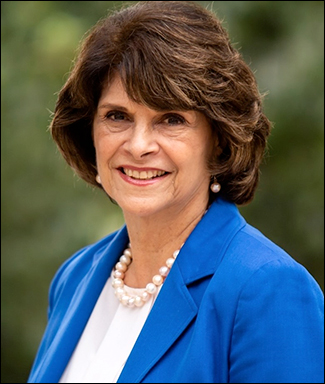Enjoy your well-earned holiday season break. Our regular Political Updates will return on January 3, 2022.
Monthly Archives: December 2021
Merry Christmas &
Rep. Lucille Roybal-Allard to Retire
By Jim Ellis
Dec. 23, 2021 — House retirement announcements keep coming, as late Monday veteran California Rep. Lucille Roybal-Allard (D-Downey) made public her intention not to seek a 16th term next November.In the 1992 election, Roybal-Allard, then a member of the California Assembly, won the open campaign to succeed her father, US Rep. Ed Roybal (D-CA), as he was concluding his own 30-year congressional career. Combined, the Roybal family will have held the Los Angeles County-based congressional district for 60 consecutive years when Rep. Roybal-Allard completes her current term at the beginning of 2023.
The congresswoman’s retirement announcement comes on the heels of fellow Los Angeles US Rep. Alan Lowenthal’s (D-Long Beach) pronouncement over the last weekend that he will not seek re-election. Both Roybal-Allard and Lowenthal are 80 years old.
The Lowenthal retirement apparently produced discussion within the California Citizens Redistricting Commission membership of collapsing his 47th District and combining it with Roybal-Allard’s 40th, which is nearby. They then agreed upon such a design, which would have meant a major constituency change for the congresswoman, taking her into a substantial amount of territory that she had not previously represented.
The redraw design makes sense particularly when seeing that the Roybal-Allard district, the most Hispanic seat in the nation with a population percentage exceeding 87 percent, is the CD also needing the greatest population influx, some 70,139 individuals, among the 35 California districts requiring more people.
Directly to the west of Roybal-Allard’s 40th lies Rep. Karen Bass’ 37th CD that includes Culver City and part of the Watts area. In late September, Bass announced that she will run for the open Los Angeles mayor’s office, becoming the first California member to create an open seat in the state delegation.
The original redistricting draft combined this district largely with Rep. Maxine Waters’ (D-Los Angeles) CD, but with Reps. Roybal-Allard and Lowenthal now retiring, combining their two seats became the logical redrafting move. The Bass district was then restored.
Combining the 40th and the 47th into a new 42nd CD in conjunction with other adjustments, allows the Commission members to meet the state’s population quota of 760,350 residents per district throughout the Los Angeles metro area. Together, the 18 districts that comprise LA County required a population influx exceeding 620,000 people, hence collapsing a central and southern Los Angeles County pair of districts into one became the commissioners’ most logical solution.
Florida Rep. Stephanie Murphy &
New Jersey Rep. Albio Sires to Retire
By Jim Ellis
Dec. 22, 2021 — In a surprising move, three-term Florida US Rep. Stephanie Murphy (D-Winter Park) announced that she won’t run for re-election next year, becoming the third member of the Florida delegation to leave the House at the beginning of 2023 in addition to the state gaining a new seat in national reapportionment. Not included in the total is the special election to fill the late Rep. Alcee Hastings’ (D-Delray Beach) South Florida 20th District that will conclude on Jan. 11.The Murphy move means the Sunshine State will host four open congressional elections next year, three of which lie in the Orlando metro area. In addition to Congresswoman Murphy, Rep. Val Demings (D-Orlando) in an adjacent district is also leaving the House. She is challenging Sen. Marco Rubio (R). Furthermore, the state’s new 28th District will likely be placed in the Orlando metroplex. The lone non-Orlando area open seat is in the Tampa Bay area as Rep. Charlie Crist (D-St. Petersburg) is foregoing re-election to again run for governor.
Rep. Murphy was elected in 2016, defeating then-Rep. John Mica (R) in a 51-49 percent result after the Florida state Supreme Court made the 7th District more Democratic during a mid-decade redistricting order. She averaged 56.5 percent of the vote in her two subsequent re-election campaigns and holds a seat on the powerful Ways & Means Committee.
Also, New Jersey Rep. Albio Sires (D-West New York) announced Monday that he will not seek a ninth full term in the House. The congressman was first elected in a concurrent 2006 special and general election replacing then-Rep. Bob Menendez (D) who had been appointed to the Senate. At the time, the eastern New Jersey district that borders the Hudson River across from New York City was numbered CD-13. It was changed to number 8 in the 2011 redistricting plan.Prior to his election to Congress, Sires served in the New Jersey General Assembly and was the body’s speaker from 2002-06. During the 1995-2006 period, he was the mayor of West New York, and concurrently served in the legislature for most of that time. Prior to a 2006 law banning the practice, it was commonplace for New Jersey mayors to simultaneously hold both their municipal position and serve in the legislature.
Rep. Titus (D) Decries Nevada Dem Map
By Jim Ellis
Dec. 21, 2021 — Nevada Congresswoman Dina Titus (D-Las Vegas) is drawing a great deal of recent media attention largely for the vulgar way in which she described the Democrats’ new Sliver State congressional redistricting map before a meeting of the Nevada AFL-CIO.She is upset because her once politically rock-solid downtown Las Vegas-anchored district is now in the competitive realm, and she believes the legislators not only did her a disservice, but endangered, from a Democratic partisan context, all of the Clark County districts.
At the labor meeting, Titus described what the state Democrats did by saying, as quoted in the Nevada Current online publication:
“… you read that the Republicans are using gerrymandering to cut out Democratic seats, but they didn’t have to in this state. We did it to ourselves.”
Nevada is one of the 15 Democrat trifecta states — which is where one party controls the governor’s office, the state Senate, and state Assembly — and therefore holds the redistricting pen. The number of places where they can actually gain congressional seats through the re-draw process, however, is only four: Illinois, New Mexico, New York, and Oregon, which is why it is critical for the Nevada Democrats to hold their three Silver State seats. Rep. Mark Amodei’s (R-Carson City) northern 2nd District, for geographic and political reasons, must remain safely Republican.
Rep. Titus, however, believes the final map puts all three of the state’s Democratic districts in jeopardy. Predicting what could be a difficult year for the party in Nevada, Rep. Titus apparently thinks Republicans could sweep the state’s four congressional seats in the 2022 election.
She further stated, again as the Nevada Current reported, that,
“Republicans are going to turn out, and they are excited. Democrats are kind of ‘meh, I have to pay more gas prices. Hispanics aren’t going to want to turn out if we don’t get something for immigration. I mean, why would they?”
Titus remembers the 2014 election cycle when Democratic turnout was so poor in a down year for her party that Republicans swept the ticket from top to bottom.
Calif. Rep. Alan Lowenthal to Retire
By Jim Ellis
Dec. 20, 2021 — California Congressman Alan Lowenthal (D-Long Beach) announced late last week that he will not seek a sixth term in the House next year becoming the 18th Democratic member to either retire or run for another office.Rep. Lowenthal, 80, will have been in elective office for 30 consecutive years at the completion of this term, including his time in the California Senate, State Assembly, and on the Long Beach City Council. Prior to venturing into elective politics, Lowenthal was a college psychology professor at the California State University at Long Beach.
The congressman’s 47th District is a small urban CD that contains parts of Los Angeles and Orange Counties. He represents the cities of Long Beach and Signal Hill in LA County, and Cypress, Westminster, and Garden Grove in Orange County. His district also is home to the Port of Long Beach, which is the largest container terminal in the nation, and is one of the key reasons Lowenthal sits on the Transportation and Infrastructure Committee.
With a second California open seat coming in a period of just over a week — Rep. Devin Nunes (R-Tulare) announced Dec. 6 that he would resign — redistricting strategy could significantly change. The California Citizens Redistricting Commission members are in the process of developing a new congressional map.
California loses a seat in reapportionment, and the population numbers suggest that one of the Los Angeles area seats will be collapsed. Rep. Lowenthal’s district appeared to be one of the prime targets for elimination. The first draft map, however, yields a collapsing of Rep. Karen Bass’ 37th CD in the Culver City area largely because she announced her campaign for mayor of Los Angeles early, thus giving everyone advance notice that she would not be seeking re-election to the House. The Lowenthal retirement coupled with Nunes’ in the Central Valley, however, could change the redistricting strategy.
A total of 18 congressional districts touch Los Angeles County. Nine are fully contained within the county boundaries, while the other nine, such as Rep. Lowenthal’s 47th District, expand into neighboring domains. All 18 require more residents to meet the new state per district population quota of 760,350 individuals. CA-47 needs an additional 45,679 people to reach the resident requirement, making it the 13th highest California CD that requires increased population.
Rep. Bass’ district, one of the nine fully contained within LA County, ranks 17th among the California CDs needing more people, translating to 38,173 bodies.
Texas 2022 Candidate Filing Closes
By Jim Ellis
Dec. 17, 2021 — Texas became the first state to see candidate filing close for the 2022 elections, so the campaign season has officially been launched.
In the Lone Star State, candidates file with their respective state party organizations, or county parties if their race is fully contained within one entity, and not the Secretary of State. Therefore, the filings might not yet be fully recorded and approved. The statewide primary is scheduled for March 1. If no candidate for whatever office does not receive majority support in the first election, a runoff between the top two finishers will occur on May 24.
What we know so far is that Gov. Greg Abbott (R) will face a significant Republican primary challenge from former Florida congressman and ex-Texas Republican Party chairman Allen West and former Dallas state Sen. Don Huffines. The latter man, who was defeated for re-election in 2018, has the ability to self-fund a statewide primary campaign. Former congressman and 2020 presidential candidate Beto O’Rourke will be the Democratic nominee as he faces only minor opposition in the party primary.
Regardless of the level of competition, Gov. Abbott, though his approval ratings are at a low ebb in his seven-year career as the state’s chief executive, is a heavy favorite in both the Republican primary and the 2022 general election.
The main constitutional office of interest is the attorney general’s race. Here, embattled incumbent Ken Paxton (R), who has for years been under a federal SEC indictment that has yet to move forward, and who has been publicly accused of having an ongoing extra-marital affair, faces three strong candidates for re-nomination: State Land Commissioner George P. Bush, US Rep. Louie Gohmert (R-Tyler), and state Supreme Court Justice Eva Guzman.
Though Paxton has personal and legal problems, his favorability ratings among Republican primary voters is still surprisingly high. Forcing the two-term attorney general into a runoff election, however, is a clear possibility.
With the state having no Senate race in 2022, the federal focus turns to the new 38-member US House delegation. Texas gained two seats in national reapportionment, thus increasing their delegation size from 36 to 38 seats. The state will wield 40 electoral votes in the next presidential election, second only to California’s reduced 54.
Alabama Senate:
Primary Now Competitive
Dec. 16, 2021 — For the most part, early polling has given Alabama US Rep. Mo Brooks (R-Huntsville) a big lead in his open Senate Republican primary race, but a series of later surveys reveal a major change on the ballot test.
According to the new McLaughlin & Associates survey of the Alabama Republican electorate, Rep. Brooks’ lead has dropped to single-digit points over former Business Council of Alabama CEO Katie Britt, with business owner and military veteran Michael Durant, a relative newcomer to the race, also making his presence felt. An earlier unrelated poll actually found Britt posting a slight edge over the field.
The McLaughlin study (Dec. 6-9; 500 likely Alabama Republican primary voters; 80 percent self-identified Republicans; 20 percent non-Republicans who say they will vote in the Republican primary, live interview) projects Rep. Brooks to be holding a 31-26-17 percent advantage over Britt, who is also a former chief of staff to retiring Sen. Richard Shelby (R), and Durant. In a troubling sign for Brooks, a hypothetical runoff contest between the congressman and Britt fell the latter candidate’s way on a 39-37 percent count.
Before November, Brooks held huge polling leads — from 23 to 43 points in surveys conducted during the August through October period. The McLaughlin poll seems to reinforce a developing trend that the Strategy Group and the Cygnal polling organization detected in November polling.
Cygnal (Nov. 3-4; 650 likely Alabama Republican primary voters, text, interactive voice response, email), polling for the Alabama Conservatives Fund, actually saw Britt, for the first time, taking a slight 24-22-9 percent lead over Rep. Brooks and Durant.
The Strategy Group (Nov. 1-4; 784 likely Alabama Republican primary voters; live interview and interactive voice response system) found the Brooks lead over Britt to be only 28-23 percent. The SG poll was conducted largely as an issue survey for the Alabama House Republican Caucus, but they asked one question to test a Brooks-Britt isolated Senate primary, which could be a precursor to a runoff contest.
The Alabama race is another where former President Donald Trump has come out early with an endorsement. His support helped Rep. Brooks build a large early lead, but the ex-president will have to come more to the forefront if his candidate is to reverse the latest trend.








